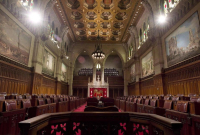Support strong Canadian climate journalism for 2025
The Senate voted Tuesday to delete a so-called escalator tax on booze from the federal government's budget, defying Prime Minister Justin Trudeau's insistence that only the elected House of Commons has authority over budgetary matters.
Senators voted 46-32 late Tuesday to accept the report of the Senate's national finance committee, which earlier in the day passed a series of amendments aimed at removing the government's plan to increase the federal excise tax on beer, wine and spirits automatically by the rate of inflation each year.
The amendments came one day after the Senate narrowly defeated a motion that would have carved out provisions dealing with the creation of a new infrastructure bank into a separate bill.
The committee — whose membership includes independent Sen. Andre Pratte, author of the motion to split the bill — did not propose any changes to the infrastructure bank provisions.
The bill will now go Wednesday to third reading debate in the upper house, during which individual senators could opt to propose additional changes, followed by a final vote.
The House of Commons would have to concur with any changes approved by the Senate, something Trudeau has made clear is not in the cards.
But the prime minister's warning that unelected senators have no business re-writing a budget doesn't hold water for some senators. Although the Senate can't initiate a money bill, it does have the right to amend one — or even defeat it outright, as happened in 1993, they note.
"I believe that the Senate does have the right to amend finance bills, not to raise taxes but to otherwise amend them," independent Liberal Sen. Joan Fraser said Tuesday on her way into the committee meeting.
Pratte said he may yet support some amendments to the bill, but won't propose any more himself on the infrastructure bank. The debate and vote on his motion Monday convinced him that a majority of senators have no appetite for changing the bill.
"There's no use working on amendments when you know the majority of the Senate will reject those amendments."
In any event, since Trudeau has been clear that any changes approved by the Senate would be rejected by the Liberal majority in the Commons, Pratte predicted most senators will eventually wind up bowing to the will of the elected chamber.
"It's obvious that this is not one of those special circumstances where the Senate would insist on its amendments," he said. "It's pretty obvious that the Senate would defer to the government's will."
The government maintains the $35-billion infrastructure bank is an integral part of its economic plan. It is to be launched with $15 billion in direct federal investments and another $20 billion in repayable contributions, loans and loan guarantees. The government hopes to leverage up to $5 in private investment for every $1 in government funding to finance what it calls “transformational” infrastructure projects.
Pratte and other senators fear the bank’s governance structure could allow political interference in the choice of projects that get funded. They’ve also expressed concern that taxpayers will wind up on the hook for projects that go over-budget or flop.
The amendments to delete the escalator tax on alcohol were proposed by Conservative Sen. Elizabeth Marshall.
At a Senate committee meeting last week, Finance Minister Bill Morneau appealed to senators to stop referring to the provision as an "escalator." He argued that it would actually result in the tax remaining constant, "in real terms," once inflation is taken into account.
However, a number of senators expressed concern that the automatic yearly tax hikes would potentially devastate many small Canadian breweries and wineries.





Comments